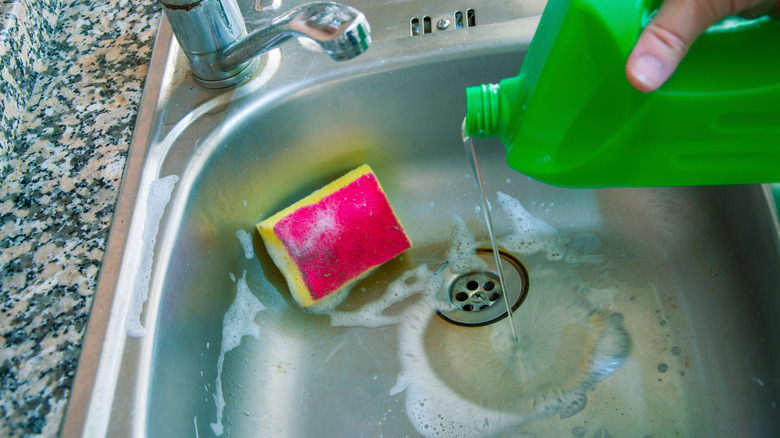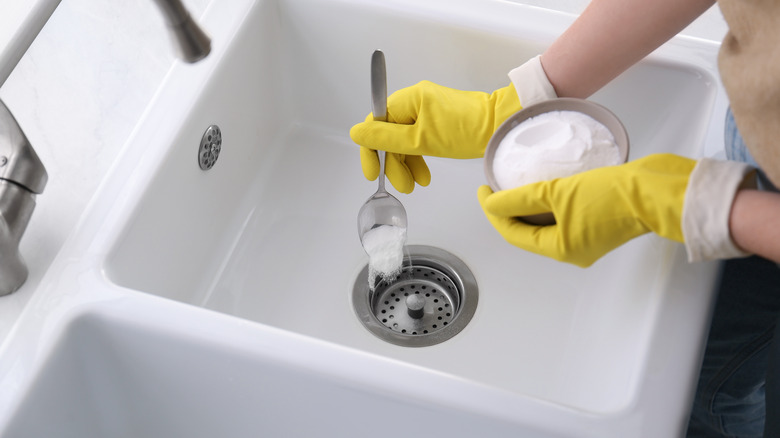Why You Should Think Twice Before Pouring Bleach Down The Drain
From whitening shirts to sanitizing bathroom countertops, bleach is a versatile chemical that's effective for cleaning various items in your home. However, it's far from a perfect cleaning solution; it permanently stains some materials, can irritate your skin and airways, and expires relatively quickly.
That's right, bleach expires! The Water Quality and Health Council explains that it oxidizes after about six months, becoming 20% less effective yearly. If you've had the same jug for a few years, it may be time to dispose of the old one. However, what happens if you pour it directly down the drain?
Expired bleach mostly degrades into saltwater (per The Zoe Report), so it's generally okay to flush. However, it can be a fickle solution to deal with. So whether you're disposing of old bleach or trying to clean and deodorize your sinks, it's essential to be extremely careful. Handling it the wrong way can cause severe problems for you and your pipes, so ensure you follow the proper handling rules and look for alternatives to bleach when possible.
Using bleach can be dangerous
Small amounts of bleach are probably harmless, but when you pour it straight into your drains, some of it will become caught in the P-trap of your pipes (per Mr. Kitchen Faucets). Rinsing thoroughly with water can help to dilute and remove some of the trapped solution. However, if you forget to follow up with water or start pouring other chemicals, you could have a severe threat on your hands.
Bleach should never come into contact with other acids, including ammonia, vinegar, window cleaner, drain cleaner, or even lemon juice. Mixing it with acids creates a toxic chlorine gas (per McGill University). Even a tiny amount of this can irritate your nose, eyes, and airways. However, inhaling too long can lead to tissue damage, fluid buildup, coma, and death (via Healthline).
But pouring bleach down the drain isn't just bad for your health; it can also wreak havoc on your plumbing. While it's excellent at sterilizing and removing odors, it won't help you unclog your drains. Graydon Faulstick Plumbing explains that the wrong bleach concoction can worsen existing clogs. For example, suppose there is a mass of hair, crumbs, algae, food, or other materials (especially acidic). In that case, a chemical reaction could shift the mass deeper, create toxic fumes, and build pressure in your pipes.
There are plenty of safe alternatives
Bleach may seem like an effective sanitizer and deodorizer, but it isn't worth risking your health when there are plenty of safer ways to clean your drains. If you've recently added bleach to your drains, flush it before trying other cleaning methods.
The Complete Kitchen Company recommends pouring near-boiling water down your drain to loosen buildup and kill odor-causing bacteria. Next, follow up with a spoonful of coarse salt and a generous amount of baking soda. Add warm vinegar or lemon juice for extra cleaning power, and let the concoction sit for about ten minutes. Follow up with a thorough stream of warm water, and your drain's odors should disappear.
Kitchen garbage disposals are often the worst offenders concerning bacteria and odors. Luckily, you don't need harsh chemicals to get the job done. Instead, follow the same baking soda method described above, then toss in a few lemon wedges. For decades people have used lemons as a natural cleaner and deodorizer. Disposal QA explains that your garbage disposal will have no trouble grinding up the lemon rinds, and the citric acid will help to dissolve grease and kill odor-causing bacteria. Plus, lemons give your kitchen a more alluring scent than chlorine bleach.


